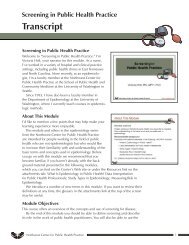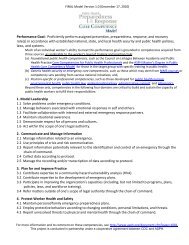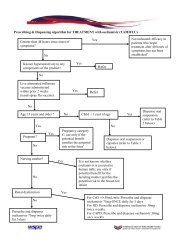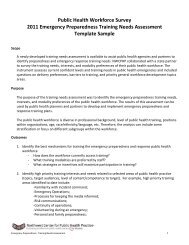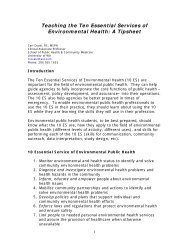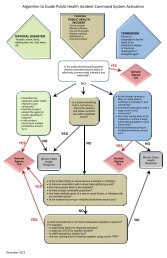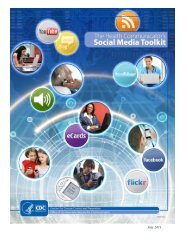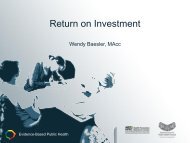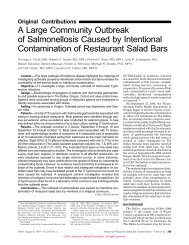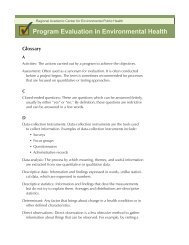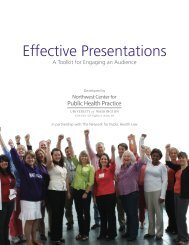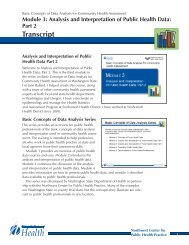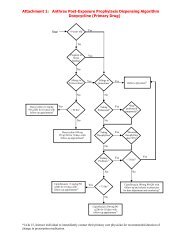Effective Adult Learning - Northwest Center for Public Health Practice
Effective Adult Learning - Northwest Center for Public Health Practice
Effective Adult Learning - Northwest Center for Public Health Practice
You also want an ePaper? Increase the reach of your titles
YUMPU automatically turns print PDFs into web optimized ePapers that Google loves.
B. <strong>Learning</strong> Interventions<br />
This worksheet can be used to determine the type of learning needed <strong>for</strong> an adult learner to attain<br />
the desired results. Place a check next to the learning types that are appropriate <strong>for</strong> your training.<br />
<strong>Learning</strong> type Description or explanation Sample Applications<br />
□<br />
Case Studies, Participants discover learning points Problem-based learning,<br />
Role Plays, and themselves. The individual assumes psychodramas, sociodramas, group<br />
Small Group<br />
Discussions<br />
roles other than his/her real ones or<br />
is thrust into settings that are different<br />
from the current one.<br />
role play, practice in handing social<br />
interactions<br />
□<br />
Classroom<br />
□<br />
Experiential<br />
□<br />
Games,<br />
□<br />
Projects<br />
□<br />
Self-Study<br />
Training,<br />
Lectures, and<br />
Lecturettes<br />
<strong>Learning</strong><br />
Table-<br />
Tops, and<br />
Simulations<br />
and<br />
Writing Tasks<br />
The individual acquires skills and<br />
knowledge through guidance from an<br />
instructor in a <strong>for</strong>mal group setting,<br />
not in the workplace. In the case<br />
of distance learning, webinars, and<br />
webcasts, the individual may be at the<br />
work site, but the session is not usually<br />
a part of work activities.<br />
Individual or group participates in<br />
structured debriefing sessions to<br />
reflect on the experiences encountered<br />
and draws conclusions.<br />
The individual per<strong>for</strong>ms as she/<br />
he would in real life. The setting,<br />
however, is an artificial creation<br />
designed to resemble the natural<br />
environment.<br />
Participants reflect on their<br />
understanding of concepts,<br />
in<strong>for</strong>mation, ideas and allow them to<br />
work individually or in small groups<br />
with the content.<br />
The individual acquires skills and<br />
knowledge through self-learning,<br />
guided by structured materials ranging<br />
from print to electronic systems.<br />
Seminars, conferences, workshops,<br />
lectures, demonstrations, Internetbased<br />
classes, video and audio<br />
conferences, webinars, webcasts,<br />
certificate programs<br />
Practicum, structured and<br />
mentored internship, field<br />
placement with coaching, on-thejob<br />
practice and work sessions,<br />
and supervised transitional work<br />
settings following training<br />
Physically realistic simulators,<br />
virtual reality environments,<br />
psychologically realistic settings,<br />
in-basket exercises, structured<br />
games, virtual labs, assessment<br />
centers<br />
Reports, PowerPoints, articles,<br />
postings, larger writing projects<br />
Directive instruction, computerbased<br />
modules, web-based virtual<br />
labs, CD-ROM/DVD learning<br />
modules, web explorations<br />
www.nwcphp.org <strong>Effective</strong> <strong>Adult</strong> <strong>Learning</strong>: A Toolkit <strong>for</strong> Teaching <strong>Adult</strong>s | 26



